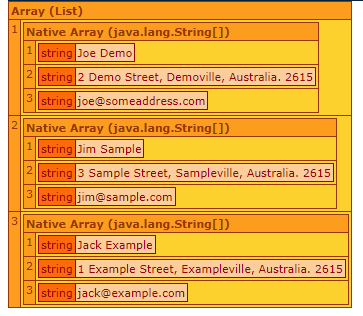<alias name="createColorMap" language="Lua" id="179">
<value>local mapcolors ={"aliceblue", "antiquewhite", "aqua", "aquamarine", "azure", "beige", "bisque", "black",
"blanchedalmond", "blue", "blueviolet", "brown", "burlywood", "cadetblue", "chartreuse",
"chocolate", "coral", "cornflowerblue", "cornsilk", "crimson", "cyan", "darkblue", "darkcyan",
"darkgoldenrod", "darkgray", "darkgreen", "darkkhaki", "darkmagenta", "darkolivegreen", "darkorange",
"darkorchid", "darkred", "darksalmon", "darkseagreen", "darkslateblue", "darkslategray",
"darkturquoise", "darkviolet", "deeppink", "deepskyblue", "dimgray", "dodgerblue", "firebrick",
"floralwhite", "forestgreen", "fuchsia", "gainsboro", "ghostwhite", "gold", "goldenrod", "gray",
"green", "greenyellow", "honeydew", "hotpink", "indianred", "indigo", "ivory", "khaki",
"lavender", "lavenderblush", "lawngreen", "lemonchiffon", "lightblue", "lightcoral",
"lightcyan", "lightgoldenrodyellow", "lightgreen", "lightgrey", "lightpink", "lightsalmon",
"lightseagreen", "lightskyblue", "lightslategray", "lightsteelblue", "lightyellow", "lime",
"limegreen", "linen", "magenta", "maroon", "mediumaquamarine", "mediumblue", "mediumorchid",
"mediumpurple", "mediumseagreen", "mediumslateblue", "mediumspringgreen", "mediumturquoise",
"mediumvioletred", "midnightblue", "mintcream", "mistyrose", "moccasin", "navajowhite", "navy",
"oldlace", "olive", "olivedrab", "orange", "orangered", "orchid", "palegoldenrod", "palegreen",
"paleturquoise", "palevioletred", "papayawhip", "peachpuff", "peru", "pink", "plum", "powderblue",
"purple", "red", "rosybrown", "royalblue", "saddlebrown", "salmon", "sandybrown", "seagreen",
"seashell", "sienna", "silver", "skyblue", "slateblue", "slategray", "snow", "springgreen",
"steelblue", "tan", "teal", "thistle", "tomato", "turquoise", "violet", "wheat", "white"
, "whitesmoke", "yellow", "yellowgreen"}
function tablelength(T)
local count = 0
for _ in pairs(T) do count = count + 1 end
return count
end
local maxcolumns = 10
local colorcount = tablelength(mapcolors)
local mapdir
local c
local targetcolor = 0
local r = 0
local numrows = colorcount/maxcolumns + 1
for r = 1, numrows do
if r % 2 == 0 then
mapdir = "e"
else
mapdir = "w"
end
-- always drop down for each row
targetcolor = targetcolor + 1
if targetcolor > colorcount then
break;
end
zs.make("s",mapcolors[targetcolor])
zs.func.roomcol(null,mapcolors[targetcolor])
for c = 1,maxcolumns - 1 do
targetcolor = targetcolor + 1
if targetcolor > colorcount then
break;
end
zs.make(mapdir,mapcolors[targetcolor])
zs.func.roomcol(null,mapcolors[targetcolor])
end
end
</value>
</alias>

